
|
| Name: _________________________ | Period: ___________________ |
This test consists of 5 multiple choice questions, 5 short answer questions, and 10 short essay questions.
Multiple Choice Questions
1. Where did the meeting between President Ford and Soviet Premier Brezhnev take place?
(a) Moscow.
(b) Vladivostok.
(c) St. Petersburg.
(d) Ekaterinberg.
2. What word is used to describe the agreement between President Ford and Soviet Premier Brezhnev?
(a) Worthless.
(b) Confused.
(c) Ill-planned.
(d) Clumsy.
3. In which year did this person speak out as a member of the administration?
(a) 1959.
(b) 1951.
(c) 1968.
(d) 1942.
4. The Chinese planned to accomplish this task in ___ years.
(a) 3.
(b) 5.
(c) 12.
(d) 6.
5. Which Russian premier made the visit?
(a) Andropov.
(b) Gorbachev.
(c) Khrushchev.
(d) Stalin.
Short Answer Questions
1. Which country was most threatening in 1973?
2. What was the office filled by Zhou?
3. In what year did this event occur?
4. The meetings with Mao and Zhou took place in which year?
5. Who was the director of the CIA at this time?
Short Essay Questions
1. Who is considered to be one of the greatest diplomats of the 19th century? What theory does Kissinger refer to when speaking about the man?
2. What caused the Chinese to confront Communism?
3. Who stepped in after Zhou bowed out of the political race?
4. After Mao announced his illness and retirement, China was in danger. Why?
5. How did the changes in government personnel change Sino-United States. relationships?
6. What were Deng's steps in the modernization of China? How did they compare to Mao's plans?
7. What changed in Russia in the mid-1950s? What caused the change?
8. Mao was referred to as both a revolutionary and a pragmatist. How did Mao typically behave in a political sense?
9. How did China change in the first two decades after it became a Republic?
10. Kissinger discusses the death of two major Chinese leaders. Who were they? When did they die?
|
This section contains 744 words (approx. 3 pages at 300 words per page) |

|




